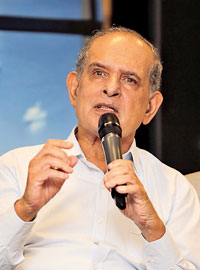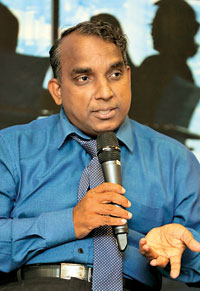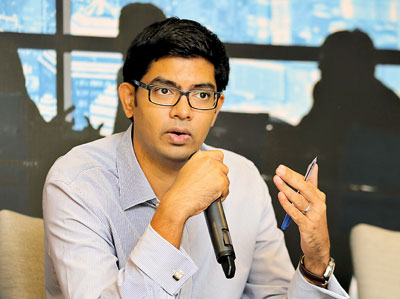New policies in the pipeline on election campaign funding

Mr. Nalin Abeysekera
While the presidential poll is all set for next Saturday November 16, billions of rupees have been pumped in for election campaigning by various parties on behalf of their respective candidates. How and where the money came from remains a mystery, unless otherwise a report on the expenses incurred is declared by each party or candidate to the Election Commission (EC).
The EC has taken note of all the campaign funding and is now preparing a policy document which seeks to restrict campaign funds. The policy document will refer to a ceiling on campaign funds of each candidate, it was revealed on Tuesday when the Sunday Times Business Club (STBC) hosted a discussion on ‘Presidential Election 2019 – Vote Wisely’ at the Hilton Hotel in Colombo.
The panellists for the discussion were EC Member and former Legal Draftsman, Nalin Abeysekera; Peoples Action for Free and Fair Election (PAFFREL) Executive Director, Rohana Hettiarachchi and Transparency International Sri Lanka, Executive Director, Asoka Obeyesekere.
During the question and answer session Mr. Abeysekera emphasised on the restriction of funds for election campaign. He said, “In 1980’s there was a ceiling of provision granted to each candidate, somewhere close to Rs. 5,000. But now policies and guidelines have changed.”

Mr. Rohana Hettiarachchi
In his opening remarks Mr. Abeysekera observed that this year’s election will be on the basis of a simple majority system where the candidate who gets the most number of votes will become the President of the country; that is if no candidate accumulates more than 50 per cent of the votes. If voters have only one choice of candidate they can mark ‘X’ in front of the candidate’s name and symbol. If the voters have a preference of candidates they can write 1, 2 and 3 in the order of their preference in front of the candidate’s name and symbol.
Preferential votes will be taken into consideration only if the top two candidates have obtained less than 50 per cent of the votes. Mr. Hettiarachchi stated that the 2018 registry of persons is used for the presidential election and voters must be registered in that registry. Also voters must prove their identification when voting.
A voter does not necessarily need to have the poll card to vote if he or she is registered in the 2018 registry and have an identification document. Identification documents that prove the right to vote are the national identity card, valid driving license, valid passport, pension ID, elderly ID and any other ID issued by some sort of law in Sri Lanka.
The 2019 registry of persons is also completed but not yet certified. As per law the current existing registry has to be used for elections. Since the 2019 registry is not yet certified more than 350,000 people will not be eligible to vote. Professionals need to look into the legal framework so that more people can exercise their voting rights, added Mr. Hettiarachchi.
He also stressed, this year there are 35 candidates contesting for the presidential election and the number can increase up to 100 next time. There are 70 political parties out of which 64 are actively functioning. “If you are a parliamentarian and have Rs. 75,000 you can contest the presidential election. Mostly people are contesting for their benefits. Contestants get free air time through national television and radio, they can vote in any of the polling stations, they can assign their people in the polling stations and so on. There are indirect benefits too that parliamentarians misuse where a policy must be implemented to block all of them.”

Mr. Asoka Obeyesekere. Pix by Sameera Weerasekera
Mr. Hettiarachchi noted that more than Rs. 300 million is spent by the government on candidates who joined newly this year. “This is really misusing the democracy in this country. We need to safeguard the democracy and somehow come up with a law before the next presidential election. Strict policies need to be implemented as to who should contest in an election.”
The EC is also looking at the advanced or mobile voting system for people who are unable to vote on elections day such as doctors, remand prisoners, EC employees, media personnel, hospitalised people and so on. He also mentioned that more than 120,000 people have come to Sri Lanka to cast their votes.
Mr. Obeyesekere stated that Transparency International Sri Lanka will be monitoring the abuse of state resources during the election time. There was a gazette issued by the EC in September this year which highlights certain areas of state resource abuse. It could be classified under four key areas such as personnel, buildings, events and vehicles. There are very clear directions provided by the EC on those.
This is the first presidential election after the 19th Amendment to the constitution. Under the constitution there is a provision that in the event of a violation, they are liable to Rs. 100,000 fine and three years of imprisonment. Sometimes there are scenarios where it’s not the deficiency of the law, but deficiency on the implementation of the law. There are certain preventative effects of people being held accountable in the past elections, he added.
Transparency International Sri Lanka has been working for a long time on trying to get asset declarations of electorate officials into the public space. Few years ago, half of the parliamentarians’ asset disclosure was obtained but prohibited from sharing the information to the public. People should also start asking questions while taking great pride in Sri Lankan democracy, why the country is a few steps behind the regional partners. “This is not comparing Sri Lanka to the western standards, but comparing ourselves to the regional neighbours,” he said. Why can’t the EC in Sri Lanka obtain an asset disclosure together with the submission of nominations? Arguably looking at the proactive disclosure elements of the right to information which could supersede any other written law the EC could potentially proactively disclose that sort of information, noted Mr. Obeyesekere.


